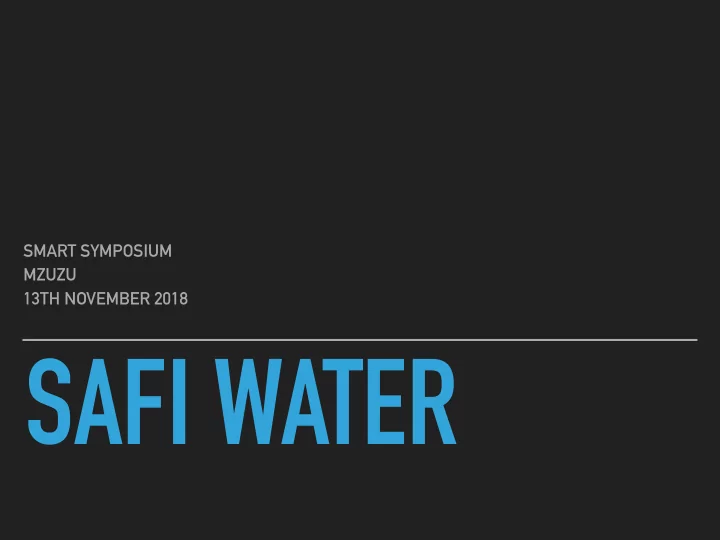

SMART SYMPOSIUM MZUZU 13TH NOVEMBER 2018 SAFI WATER
JOE DEGABRIELE - ABOUT HIM ▸ 30 years in Malawi & other…… ▸ Engineering + religious studies - philosophy & social sciences ▸ 15 years in community services - justice, human rights, social change… ▸ 22 years in WASH - management, policy, grants, evaluations, development of ideas, products & systems ▸ Business approach - San Marketing: toilets (eg corbel), MDU, waste management, management public toilets, HWTS ▸ Business owner & entrepreneur
SAFI TABLE TOPS ▸ Development of market based HWTS products ▸ Safe water in the household ▸ What people like, want, ▸ Quality ▸ Aspirational ▸ Value for Money ▸ Investing - in ideas & local production ▸ Local availability - supply chain ▸ Marketing - HWTS (?) & product
IMPORTANCE OF HWTS: F DIAGRAM ▸ Faecal Oral diseases: Whose responsibility is it to prevent????
WATER AT RISK - WASTE FLOW - URBAN ON SITE SANITATION ▸ Rapid assessment by IRC - Norton, Zimbabwe ▸ Are we investing correctly?
WATER AT RISK - DRINKING WATER QUALITY ▸ www.safiwater.com ▸ MoH studies of 20 urban wells and boreholes - All contaminated - some >100,000 cfu/100 mls ▸ Aqua for All - Thijs Merton ▸ Etc
WATER AT RISK - SAFI - MOH - LILONGWE URBAN 1
WATER AT RISK - SAFI - MOH - LILONGWE URBAN 2
WATER AT RISK - LILONGWE - T MERTON
WATER AT RISK KASUNGU - T MERTON
WATER RISK - PIPED WATER
WATER AT RISK ▸ Who has the responsibility to address public health issues? ▸ Why doesn’t the sector work more on evidence based approach? ▸ Whose job is it to alert people of water risks ?
SDG - SAFELY MANAGED ▸ i.e. SAFELY managed of water and complete sanitation systems ▸ HWTS not specifically mentioned…but….. ▸ Water - “ on premises, available when needed, free from contamination ▸ Management - includes contingency for failure - ie risk management ▸ Management - includes sustainable finance - Cap Ex and Op Ex !!!!! (who pays?)
SWAM - SAFE WATER IN MALAWI ▸ Focus on Outcomes - benefits ….. changes that result from the “project” ▸ Outcomes: ▸ Improved health - maternal, child, cholera control…. ▸ Environmental ▸ Economic ▸ Well being - esp women, girls, family ….. ▸ Improved and sustained Sales (new and parts) ▸ Relationships & partnerships ▸ Outcome Payers ….. raising INVESTMENTS by Governments, ODAs, NGOs, philanthropists, SCR, private sector…. ▸ Indicators - research data, sales, observed consistent use
SWAM ▸ Why HWTS? Why filters (different types)? Why business case? ▸ Meta studies showing highest rates of diarrhoea reduction using filtration + safe storage ▸ Safi - identified filters as most effective and marketable ▸ Smart Centre Studies - high rate of usage when filters are paid for (even subsidised) ▸ Need of sustainable finances for sustainable businesses
SWAM - IS HWTS A WORTH WHILE FINANCIAL INVESTMENT? ▸ For businesses - currently - NO !!!! ▸ business environment is not right for investment ▸ Key Partnerships not in place ▸ What it really feels like…….Sisyphus
SWAM - ROLE OF PRIVATE SECTOR? ▸ Develop / identify Market oriented products and services…… ▸ Manufacture / assemble ▸ Supply chain ▸ Market products ▸ Develop relationships with customers and partners ▸ SELL and make a profit…sustainably - The ONLY indicator for business ▸ Flexibility to respond to market (ie households & NGOs)
SWAM - BUSINESS / PRIVATE SECTOR ▸ Types of people ▸ Business people : commercial activity ▸ Entrepreneurs: a person who sets up a business, taking on financial risks in the hope of profit . ▸ Social entrepreneur - a person who establishes an enterprise with the aim of solving social problems or effecting social change . ▸ Big & small ▸ Types of private sector involvement ▸ Developers, ideas ▸ Manufacturers ▸ Assemblers / traders ▸ Marketers ▸ Lesson: private sector is a complex set of relationships
SWAM - BUSINESS MODEL CANVAS - A
SWAM - PARTNERSHIPS AN ESSENTIAL PRE REQUISITE / OUTCOME ▸ Few, if any, proven WASH businesses ▸ Some flawed - allowance based, project based ▸ Partners include ▸ Government (national & local) 111/190 ease of doing business; 50% tax on products; TI = 122/175 ▸ ODA & NGOs - little business experience; holy attitude ; top down approach; not set up for partnerships / clients …. ▸ Private sector - little incentive to invest - underdeveloped market; risks too high; don’t understand development partners; ▸ Finance - high costs; risk averse; high interest rates; low turnover; new ventures ….
SWAM - “DIAMOND” ▸ Diamond ▸ Business environment ▸ Enabling environment
SWAM - WHAT WE NEED TO DO ▸ Business environment ▸ Partnerships - the relationships - roles - power - MUST change as the business develops…. ▸ Identification of stakes ▸ Planning ▸ Sharing of risks and rewards ▸ Enabling environment ▸ Partnerships ▸ Policy environment ▸ Start up costs ▸ Financing ▸ “social marketing” to achieve social outcomes - esp value proposition
DISCUSSION POINTS ▸ How can private sector and NGOs etc partner together as EQUAL members of a team? ▸ How does this relationship change over time / tasks ? ▸ How can this relationship be managed? Who can broker / facilitate / mediate this relationship ?
Recommend
More recommend